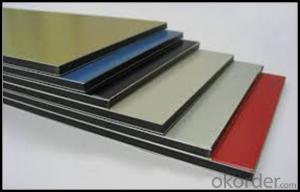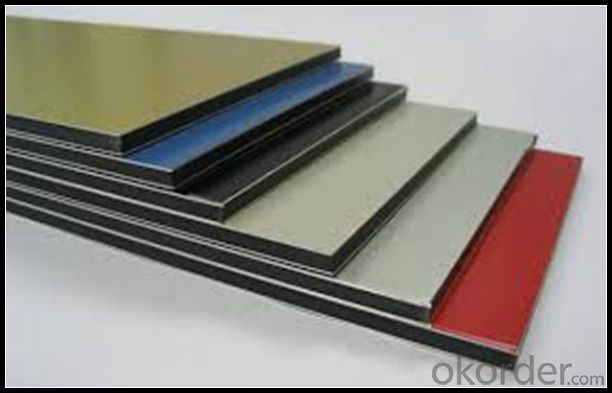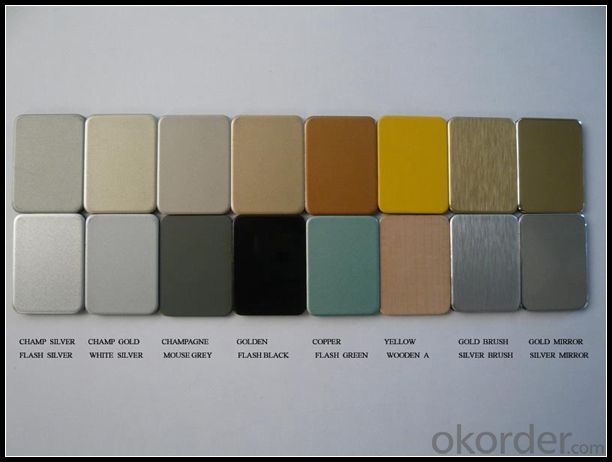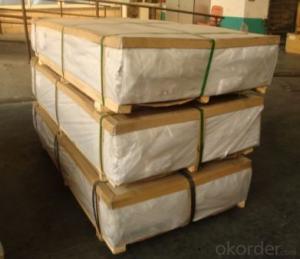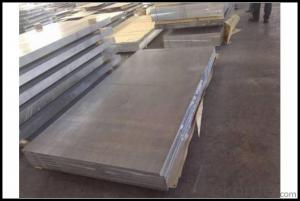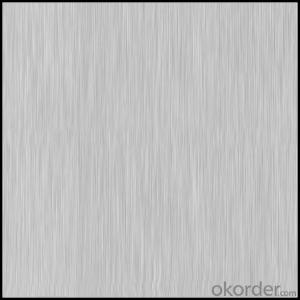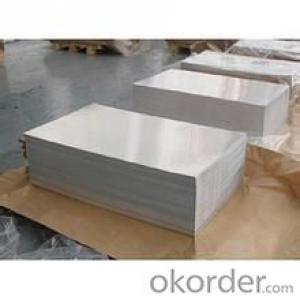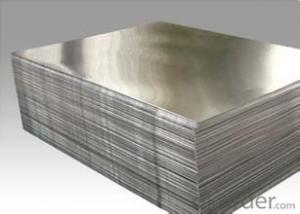Bending Aluminum Sheets - Aluminum Sheet Thickness in All Kinds Supply
- Loading Port:
- Shanghai
- Payment Terms:
- TT OR LC
- Min Order Qty:
- 5 m.t.
- Supply Capability:
- 100000 m.t./month
OKorder Service Pledge
OKorder Financial Service
You Might Also Like
Specification
1.Structure of Aluminum Sheet Thickness in All Kinds Supply
Aluminum Sheets are strengthened and cut from raw materials with different alloys, such as AA5005, AA5052, etc. They are easy for processing in different shapes, good in intensity and can be quickly installed. Aluminium Sheets for Energy Saving Curtain Walls are good in energy saving, weather resistance, fire resistance, easy for maintenance and with many colors.
Aluminium Sheets for Energy Saving Curtain Walls are widely used in construction of metal walls, metal ceilings, car decoration, advertizing panels, etc.
2.Main Features of Aluminum Sheet Thickness in All Kinds Supply
•High intensity
•Easy to be processed and shaped
•Weather resistance
•Anti-pollution & environment protection
3. Aluminum Sheet Thickness in All Kinds Supply Images
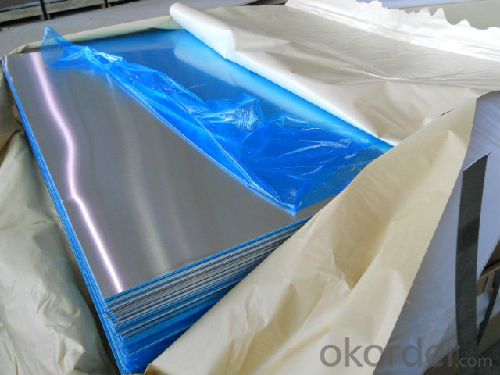
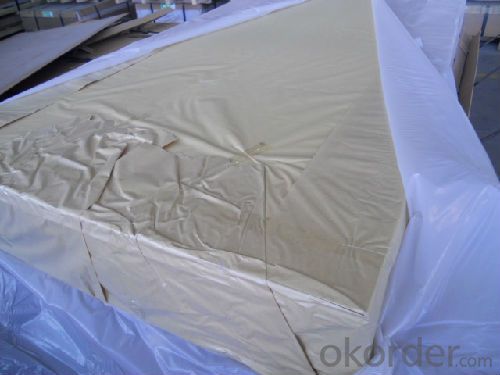
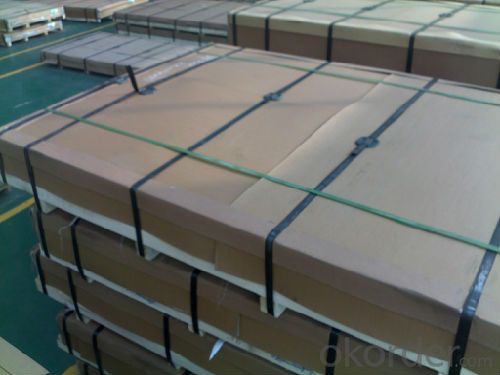
4.Specification of Painted Aluminum Sheet for Composite Panels
Alloy Number | AA5XXX |
Temper | H12, H14, H16, H18, H22, H24, H26, H32, HO, F |
Thickness | 0.1mm – 500mm |
Width | 10mm- 2200mm |
Standard | GB/T3880-2006, ASTM, ISO, EU standard |
5.FAQ
A.What about inspections to guarantee quality?
For each order for Aluminum Sheets with Mill Finished Surface AA5XXX, we will arrange strict inspection for raw materials, inspection during production and inspection for finished goods.
With requirement of customers, we also can arrange the third party inspection.
B.What about delivery?
We will put order for Aluminum Sheets with Mill Finished Surface AA5XXX in production schedule after order gets confirmed against copy of TT or L/C. Normally it takes about one month for production. Exact shipment schedule is different based on different sizes and quantity.
C.What is the MOQ?
5 tons for each size.
D. Where have you exported aluminium sheets?
We have exported aluminum sheets to many countries. Main markets include South East Asia, Middle East, North America, South America, etc.
- Q: What are the rules and standards that govern the use of aluminum sheets in construction projects?
- <p>Yes, there are regulations regarding the use of aluminum sheets in construction. These regulations vary by country and region but generally cover aspects such as material standards, safety, and environmental impact. For instance, in the United States, the American Society for Testing and Materials (ASTM) provides standards for aluminum sheet materials. Building codes like the International Building Code (IBC) also specify requirements for the use of aluminum in construction. These regulations ensure that aluminum sheets meet certain strength, durability, and performance criteria. Compliance with these regulations is crucial for safety, structural integrity, and to obtain necessary permits and approvals for construction projects.</p>
- Q: Are aluminum sheets resistant to rust?
- Yes, aluminum sheets are highly resistant to rust due to their natural oxide coating that forms a protective barrier against corrosion.
- Q: Does aluminum sheet require special handling during transportation?
- Yes, aluminum sheets typically require special handling during transportation. This is because aluminum is a lightweight yet fragile material that can easily dent, scratch, or bend. To prevent such damages, it is important to handle aluminum sheets with care, avoiding rough handling, excessive bending, or stacking heavy objects on top. Additionally, protective measures like using padding or wrapping the sheets in protective material can help ensure their safe transportation.
- Q: What is the standard thickness of aluminum sheets used for constructing carports or garages?
- <p>The thickness of aluminum sheets commonly used for carports or garages typically ranges from 0.022 to 0.032 inches (0.56 to 0.81 mm). This range provides a balance between strength and cost-effectiveness. Thicker sheets offer greater durability and resistance to weathering, while thinner sheets are more affordable but may require more maintenance over time. The specific thickness chosen often depends on the design requirements, local weather conditions, and the intended lifespan of the structure.</p>
- Q: What are the different grades of aluminum sheets available?
- There are several different grades of aluminum sheets available, including 1100, 3003, 5052, and 6061. These grades vary in terms of their composition, strength, and intended use. 1100 aluminum is the most commercially pure grade and is often used for general purpose applications. 3003 aluminum is alloyed with manganese and has improved strength and corrosion resistance. 5052 aluminum is alloyed with magnesium and has excellent weldability and formability. 6061 aluminum is alloyed with magnesium and silicon and is known for its high strength and versatility.
- Q: What are the different methods of surface etching aluminum sheets?
- There are several different methods for surface etching aluminum sheets, each with its own advantages and specific applications. Some of the most common methods include chemical etching, laser etching, and mechanical etching. Chemical etching involves using a chemical solution to selectively remove the surface of the aluminum sheet. This method is highly precise and can achieve intricate designs or patterns. It is often used for decorative purposes, such as creating logos or artwork on aluminum signage or nameplates. Additionally, chemical etching can be used to create functional features, such as improving adhesion for paint or coatings. Laser etching, on the other hand, uses a high-powered laser to remove material from the surface of the aluminum sheet. This method is extremely precise and can create very fine details. It is commonly used for marking or engraving aluminum sheets, such as serial numbers, barcodes, or product identification. Laser etching is also a non-contact process, which means it does not cause any physical damage to the sheet. Mechanical etching, or abrasive blasting, involves using an abrasive material to physically remove the surface of the aluminum sheet. This method is typically used for larger-scale applications, such as creating a textured or matte finish on aluminum panels or sheets. Mechanical etching can also be used to remove any surface imperfections or contaminants, preparing the aluminum sheet for further processing or finishing. In summary, the different methods of surface etching aluminum sheets include chemical etching, laser etching, and mechanical etching. Each method offers unique advantages and is used for specific applications, ranging from decorative designs to functional markings or surface treatments.
- Q: I am ultimately looking to have a bike that is good for both everday commuting and touring with panniers/racks long distance with camping. From what I've read on the internet steel frames are more forgiving and ride smoother. The guy at my local bike shop tells me aluminum frames have more flex and ride better. I don't know if he's just trying to make a sale (Giant dealer) or to trust him, unfortunately the staff there are all just racers not tourers. If you can recommend any brands/models to check out that'd be good. From my research thus far I am in love with Co Motion bikes, just not the price! I'm looking at $1000 max for a good touring bike. Thanks!
- The two previous bikes lack brazeons for rack mounts up front, so they don't seem suitable for heavy, loaded touring expeditions. But, I don't see any models by Giant that have front rack brazeons. Actually, their forks all appear to be carbon/composite. I agree that the Co-Motion products look great, but their prices do seem a bit high for a welded frame, even if it is made in the US. The Surly LHT would make an extremely rugged, steel tourer. But building it up to your desired specs would likely put you way over your limit.
- Q: How many square meters does the aluminum plate engrave?
- The price of aluminum sheet is calculated according to the price of aluminum ingot + processing fee (aluminum plate state), and the specific price is also different according to the size and size of aluminum sheet. If you have any questions, please ask, thank you.
- Q: This question asks for the various types of adhesives that can be used for bonding aluminum profiles when constructing exterior cladding.
- <p>For bonding aluminum profiles in exterior cladding, several types of adhesives are commonly used. These include: 1. Structural adhesives, which provide strong and durable bonds suitable for load-bearing applications. 2. Silicone sealants, known for their flexibility and resistance to weathering, making them ideal for sealing gaps and joints. 3. Acrylic adhesives, which offer good adhesion and flexibility, and are often used for bonding aluminum to other materials. 4. Epoxy adhesives, known for their high strength and resistance to chemicals, making them suitable for demanding environments. 5. Polyurethane adhesives, which provide strong bonds and excellent resistance to moisture and temperature changes. The choice of adhesive depends on factors such as the specific application, environmental conditions, and required performance characteristics.</p>
- Q: I know 7005 series aluminum is stronger and lighter than 6061series, but how does 7005 compare to 2014 series?
- This okorder /.... Aluminum is a very different animal than steel, so the choice of alloy depends on what the application is. For instance, 7075-T6 is the most common high-end alloy for chainrings, but it has comparatively low tensile and yeild strengths.....and yet it's the most durable choice for the application. Chainrings made out of a stronger alloy won't last as long and may develop stress cracks. Some of the alloy choices depend upon machining and welding characteristics, too...it's not always about the strongest or lightest. You wouldn't want a part like a seatpost to be made of the material with the best numbers but that has a tendency to crack after welding.
Send your message to us
Bending Aluminum Sheets - Aluminum Sheet Thickness in All Kinds Supply
- Loading Port:
- Shanghai
- Payment Terms:
- TT OR LC
- Min Order Qty:
- 5 m.t.
- Supply Capability:
- 100000 m.t./month
OKorder Service Pledge
OKorder Financial Service
Similar products
Hot products
Hot Searches
Related keywords
